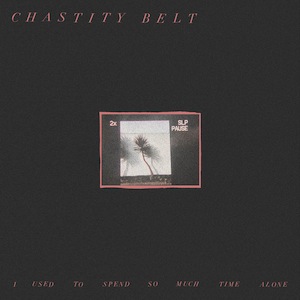The latest record from Seattle’s Chastity Belt, I Used to Spend So Much Time Alone, is an old lost friend, grown up and returned home. Dark, composed and mature, this record expresses not a longing for youth or a nostalgia for simpler times, but rather the coming to terms with a world that seems unrecognizable, full of unwanted responsibility and irrevocable choices. Chastity Belt’s record understands that, while our lives are rarely desirable and offer little freedom to escape, we can still find moments of joy amidst it all.
While the thematic concern of the album is fractured and uncertain, the musical and lyrical composition is anything but: this is Chastity Belt’s most coherent and refined work to date. Julia Shapiro’s vocals evoke the perfect balance of resignation and hope, underscored by the insistent interplay of Shapiro’s own rhythm and Lydia Lund’s lead guitar, and the stable presence of Annie Truscott’s bass and Gretchen Grimm’s drums. These elements come together to lull the listener into a space of calm amidst a storm of assorted emotions that constitute existence.
Loneliness and uncertainty are contrasted against desire and confidence, each in brief glimpses. Nothing is sustained, nothing is sustainable. The brightest and most beautiful moments in the album are the rarest and most fleeting. Songs like “5 AM” roar suddenly out of a series of calm and thoughtful meditations; just as suddenly, the din subsides. Through these flashes of turbulent emotion, Chastity Belt evokes the plight of contemporary young adulthood, in all its timid self-loathing and earnest, honest expressions of love. I Used to Spend celebrates that we are capable of pure, raw emotion, and mourns that incessant paranoid anxiety is the price we must pay for those moments of uninhibited passion.
In the end, though, we are left resigned to ourselves and our fates. Darkness is omnipresent; despite flashes of light, it will inevitably consume us once again. I Used to Spend reminds us of this. But it also reminds us to appreciate the moments when we can find freedom from our fears and worries. We may just have to be content that we are, for now, happy.


